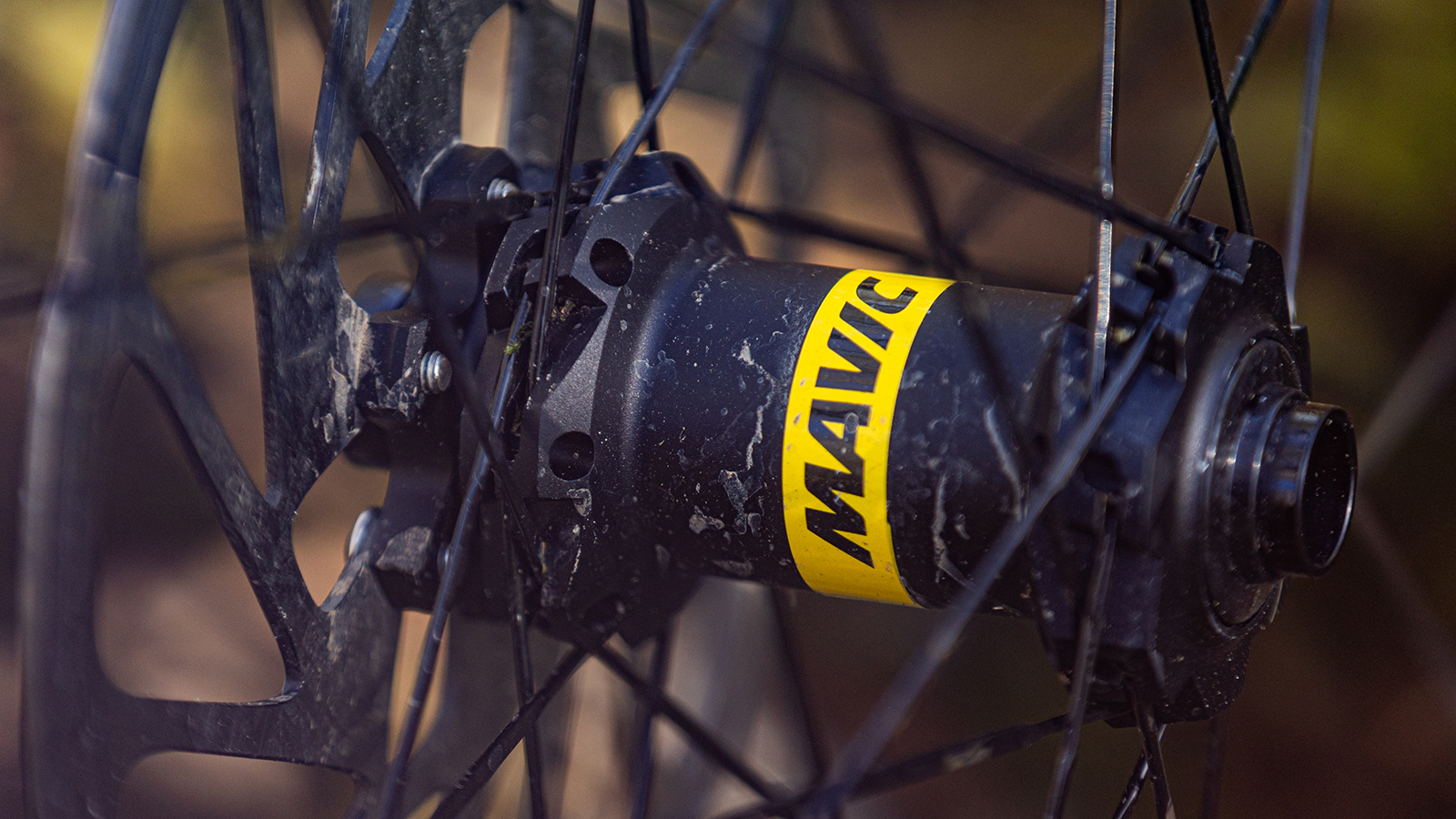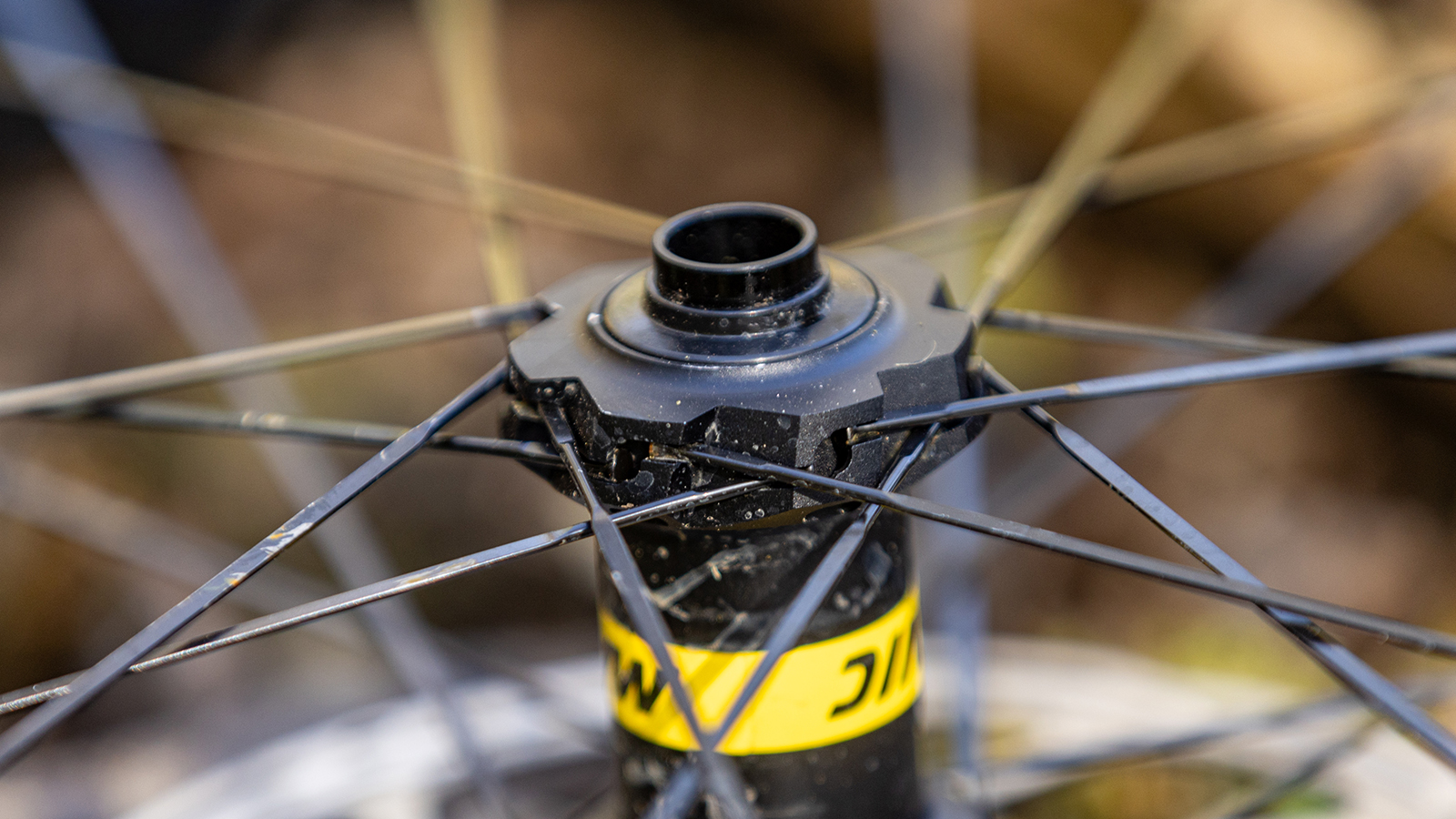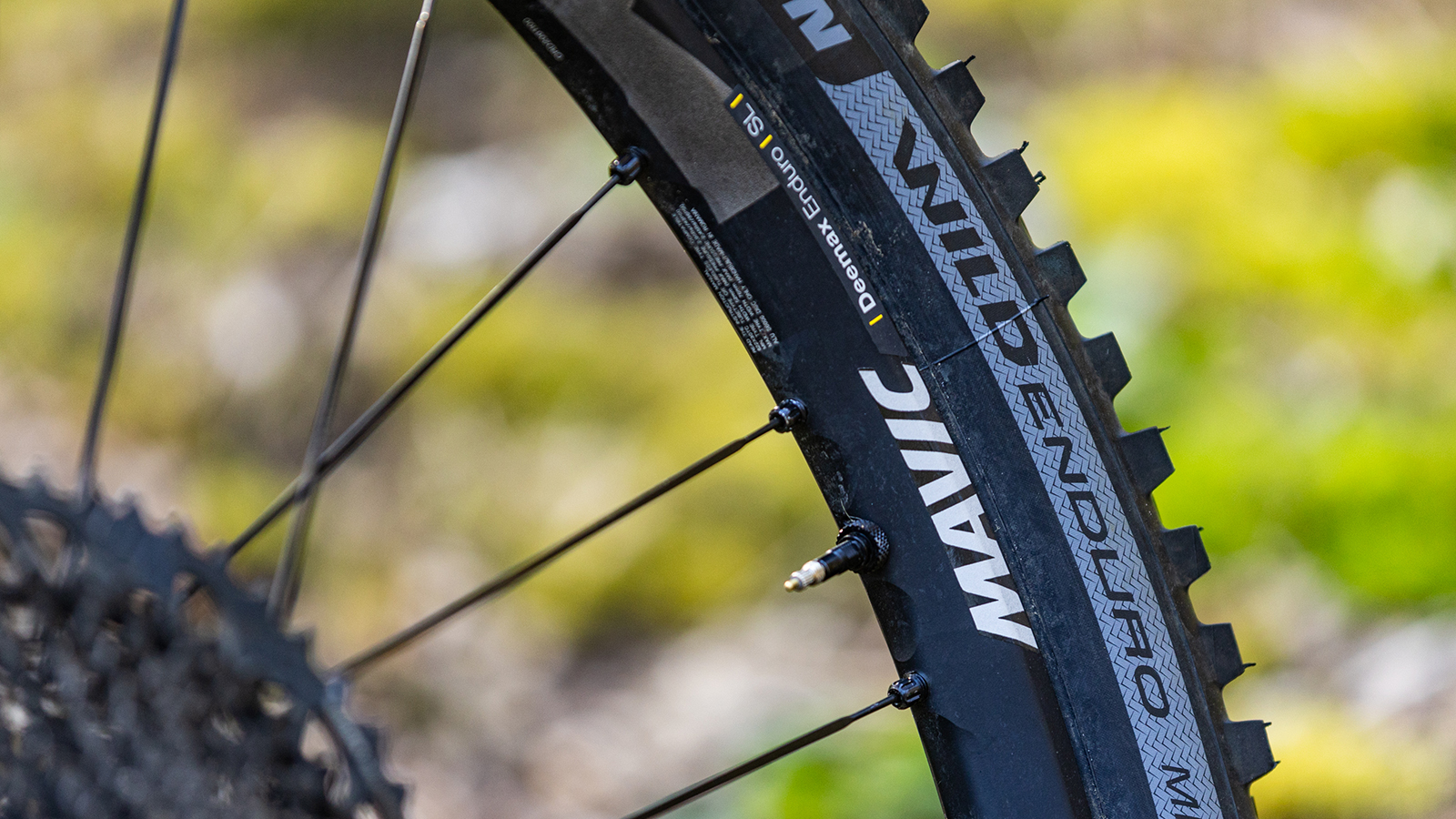Bike Perfect Verdict
Mavic’s latest generation Deemax SL is the brand’s best yet with a thoughtful package offering genuine and unique advantages over the competition.
Pros
- +
Lighter rim aids acceleration compared to equivalent weight/strength wheels
- +
Tubeless without tubeless tape
- +
Durable and hard to scratch/scuff rims
- +
Steel-bladed spokes can be replaced without removing tire
- +
Softer/well-damped ride feel
- +
Reliable ratchet 360 freehub design
Cons
- -
Softer laterally and less twist-free than some rivals
- -
Narrower hub flanges/wheel brace angle on rear doesn’t use full width of hub body
- -
Not the fastest freehub engagement
- -
Pricey
Why trust BikePerfect
Over the years, French wheel brand Mavic has pioneered some pretty cool MTB innovations, not least the widespread adoption of UST (Universal Standard for Tubeless) that’s pretty much ubiquitous in high-end off-road (and even road) cycling nowadays.
Under its Deemax moniker, the brand has consistently pushed the design envelope on downhill-orientated wheels and we’re talking right back to the days of its distinctive yellow wheels that were ultra-desirable in the early noughties.
Original and earlier generation Deemax wheels introduced concepts like UST using a sealed rim bed that doesn’t require any tubeless tape faffing and bladed spokes that can also be replaced if damaged without removing the tire.
This latest Deemax Enduro SL follows in the same lineage but also refines the brand’s unique system to bring everything bang up-to-date. Mavic’s SL is lighter overall, uses better sealing on the latest hub design and also tweaks a few of the less perfect aspects of its older designs.

Design and specifications
For years, Mavic championed narrower rims than many rivals for their reactiveness, increased strength-to-weight ratio and sharper handling. In many ways, a lot of what Mavic preached was legitimate and you’ll still find many World Cup DH and Enduro racers choosing 26 or 27mm internal rims for the same reason. Wider rims have gradually become the accepted standard though, and now the market has defaulted pretty much to the 30mm internal, it’s no surprise that these latest Deemax wheels do the same and are now wider inside to accommodate tires up to 3in width.
The rim itself is made from a proprietary Maxtal aluminum blend that’s stronger than 6061 alloy used in many cheaper rims and also arc-welded at the join for extra toughness. Each 22mm tall rim has a unique internal profile using Mavic’s patented FORE technology, which means you can change spokes without removing the tire. This is possible because the rim is milled out and threaded (M7) on the inside, rather than using a separate nipple that threads in from the reverse/outside like most rims. The outer section of rim remains undrilled, which means Mavic can make it lighter for the same strength.
There are 28 straight-pull spokes front and rear (all identical length) that are laced three-cross and threaded directly into the rim and the bladed steel spokes are cradled at the hub end and tensioned with a special knurled nipple that Mavic includes a tool for in the package (and plenty of extra spare spokes too).
The rim uses an asymmetric design so all spokes can be the same length and to help even out spoke tension – Mavic even claims it offers a more aerodynamic interface with the spokes. Finally, the hardened alloy rim also has a Black Shield treatment that better resists scratches and scuffs when riding.
Mavic’s Deemax hubs form cradles for the bladed spokes and use double-sealed bearings with an auto-preload design and then numerous end caps to switch between axle sizes. The rear hub shell flanges aren’t as wide as some rivals, so the spokes on the non-drive side don’t sit as outboard, which also means the wheel brace angle is marginally less triangulated.
Inside this rear hub is an ‘Instant Drive 360’ freehub that uses two opposing 40t ratchets for a 9-degree pick up. The design is the same as the brand’s 2K plus swanky carbon road bike wheels and also has improved waterproofness over previous generations. The seal design uses a large contactless rubber seal for lower friction that sees the hubs spin very smoothly, but there is still one less layer of sealing compared to some brands.
One niggle was I accidentally knocked the freehub body off the hub with the cassette attached while testing and if you’ve not got your phone (or a signal) to see how it all goes back together, this could be very annoying. But I’ve also done the same with plenty of ratchet freehubs like DT Swiss in the past too.

Performance
There’s something that’s hard to define about quality wheels that I always describe as ‘zippy’ – it’s a sense of wheels feeling light, tight, responsive and snappy when you put the power down that’s noticeable in how the bike surges forwards or uphill under acceleration.
Like really stiff carbon wheels, the Deemax have this speedy quality in spades but thankfully, unlike harder carbon wheels, it’s minus the significant downside of also offering a jarring ride and rattling your fillings out on off-road downhills.
Deemax Enduro SLs hit a sweet spot then of managing to feel really comfortable and smooth over rough terrain and building and maintaining pace easily. If anything, they are also softer and more comfortable than many other (aluminum) wheels in the ‘gravity’ bracket from other manufacturers and you can feel this when riding in multiple ways.
Firstly, this ‘softness’ benefits the ride by helping the wheels slink through rough, rocky and rooty terrain without ever feeling like you are getting jolted or pinged about excessively. The Deemax’s also seem to hold good pace on rough beaten up ground when you’re really trucking along in straight lines at speed. The flipside to this smoothness, however, is if you’re the kind of aggressive rider that schralps or squares off massive bike park berms, you can really feel the back wheel load up and twist. I reckon there’s definitely more twang here than with some 32-spoked stiffer alloy wheels or carbon hoops for example.
Initial installation (of Michelin dual-ply tires) was quite tight with the FORE sealed rim well design (that’s not quite as roomy in the central groove as some rim beds), but overall I love the fact that Mavic’s wheel will stay tubeless forever – I’ve lost count of the number of wheels I’ve took tires off only to accidentally damage or unravel the overlap on wet tubeless tape where the glue has degraded.
This ‘true tubeless’ aspect alone is a major plus, but particularly when combined with how you can replace a damaged spoke without digging into a messy sealant-filled tire in the first place and then having to reassemble everything. I didn’t break a single spoke during testing this time, but have definitely broken spokes more often on older Deemax designs than on many regular J-bend spoked packages.
Mavic makes a big deal of its rims being lighter due to not having to make the rim bed thicker to compensate for spoke drillings, and overall, I’d say this claim stacks up, as these Deemax SL wheels really do feel lighter and more reactive than the almost 2kg weight (that isn’t that heavy for its category anyway).
In this way, they’d make a good option for a trail rider looking for extra strength as much as an all-out DH or enduro shredder. I didn’t damage, dent, ding or loosen the wheels during testing despite running them on a 19kg longer travel mid-power e-bike either.

Verdict
Smooth and much lighter feeling than the scales suggest, Mavic’s Deemax Enduro SLs are fast-rolling DH-rated wheels that are also perfect for everyday trail riding. Not needing rim tape (with glue that deteriorates over time) is a big advantage Mavic offers and the SLs also ship with multiple replaceable spokes that you can swap without removing tires.
The hardest/heaviest riders might find the Deemax less solid and flex-free in the corners as some DH rims, but this aspect improves tracking and will also be an advantage for lots of lighter riders. Mavic’s latest ratchet freehub is solid and the overall price is OK too for a high-end well-finished and maintainable complete alloy wheel set with this much technology.
Tech specs: Mavic Deemax Enduro SL wheels
- Price: $770 / £865 / €889 (per pair)
- Components: One complete pair of wheels in either 29in or MX (29in front and 27.5in rear)
- Freehub options: SRAM XD, Shimano HG, Shimano Microspline
- Wheel options: 29in pair, 29/27.5in MX pair
- Colors: Black or yellow
- Weight: 1,945g pair (front 905g, rear 1,040g)
- Rival products: DT Swiss EX1700 Spline, DT Swiss XM1700, Hope Fortus 30 SC Pro 5

An ex-elite downhill racer, Mick's been mucking about and occasionally racing mountain bikes for over twenty years. Racing led to photo modelling and testing kit for magazines back in the day, and, nowadays, he's mostly riding enduro-style terrain on conventional and electric bikes. As curious as ever about products and tech, he's as likely to be on the other side of the lens or computer screen rating, reviewing and shooting all the latest gear. Mick's list of regular clients includes Bike Perfect, MBR, MBUK, and most of the leading UK MTB publications at one point or another.

